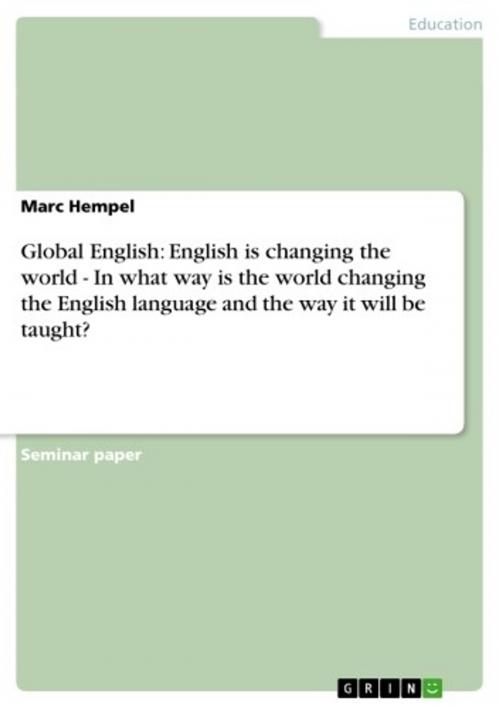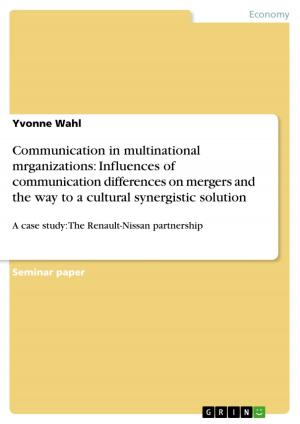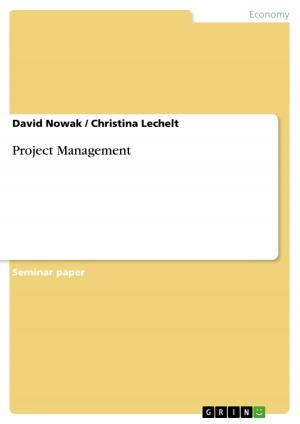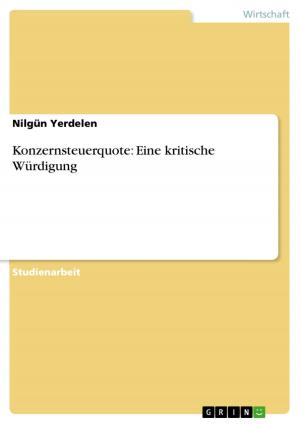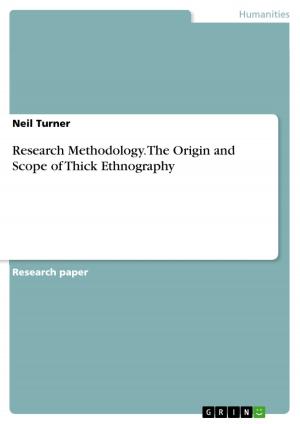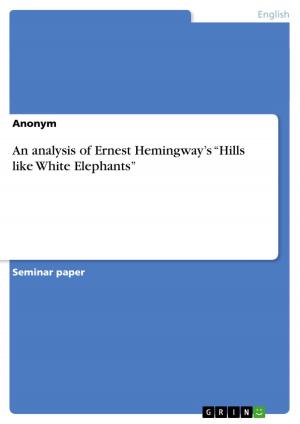Global English: English is changing the world - In what way is the world changing the English language and the way it will be taught?
In what way is the world changing the English language and the way it will be taught?
Nonfiction, Reference & Language, Study Aids, ESL, Foreign Languages| Author: | Marc Hempel | ISBN: | 9783640537471 |
| Publisher: | GRIN Publishing | Publication: | February 16, 2010 |
| Imprint: | GRIN Publishing | Language: | English |
| Author: | Marc Hempel |
| ISBN: | 9783640537471 |
| Publisher: | GRIN Publishing |
| Publication: | February 16, 2010 |
| Imprint: | GRIN Publishing |
| Language: | English |
Seminar paper from the year 2009 in the subject English - Pedagogy, Didactics, Literature Studies, grade: 1,0, RWTH Aachen University (Institut für Anglistik, Amerikanistik und Romanistik), course: Hauptseminar Sociolinguistics, language: English, abstract: The history and wide distribution of the English language - originally an Anglo-Frisian dialect first taken to Southern Britain by Germanic settlers in the 5th century and spoken by only a few - has been a most remarkable and unparalleled one. Nowadays, English is the world language, influencing each and every single aspect of the daily and professional lives of millions of people on an international scale. The metaphor of the Global Village often represents the ubiquitous process of globalisation - a phenomenon that has shaped the existence of mankind in the last couple of decades. Communication in all areas is ensured mostly through the use of the English language. It is remarkable, though, that English is only in the fourth place in terms of native speaker ranking and that its proportion is decreasing steadily. Yet what makes English so important is its use as a lingua franca - an international language that is used for communication by speakers of different languages. Estimates claim that about 1 billion people - that is about one sixth of the world population - have at least some knowledge of English and in most countries it has become one of the basic necessities in professional life. Does this development have any influence on the way we as future professionals explore, describe and - above all - teach the English language? Do native speakers still 'own' English or is it rather 'Globish', 'Franglais' or 'Denglisch' that should be taught? In this term paper I aim to offer some answers to these questions and examine different theories of teaching English as a global language. I will begin with a short chapter about the global spread of English and continue by discussing the difference and competition between traditional language standards and the new role of English as an international language. I will then briefly describe some features of 'Global English' before I will deal with my main point - the future of English teaching. Here, I will at first describe the characteristics of the traditional methods - English as a foreign language (EFL) and English as a second language (ESL) - and then have a closer look at two newer models - Basic Global English (BGE) and Content and Language Integrated Learning (CLIL). I will conclude this paper by trying to postulate a realistic future of English language teaching - in schools as well as universities - by considering a variety of different scientific proposals.
Seminar paper from the year 2009 in the subject English - Pedagogy, Didactics, Literature Studies, grade: 1,0, RWTH Aachen University (Institut für Anglistik, Amerikanistik und Romanistik), course: Hauptseminar Sociolinguistics, language: English, abstract: The history and wide distribution of the English language - originally an Anglo-Frisian dialect first taken to Southern Britain by Germanic settlers in the 5th century and spoken by only a few - has been a most remarkable and unparalleled one. Nowadays, English is the world language, influencing each and every single aspect of the daily and professional lives of millions of people on an international scale. The metaphor of the Global Village often represents the ubiquitous process of globalisation - a phenomenon that has shaped the existence of mankind in the last couple of decades. Communication in all areas is ensured mostly through the use of the English language. It is remarkable, though, that English is only in the fourth place in terms of native speaker ranking and that its proportion is decreasing steadily. Yet what makes English so important is its use as a lingua franca - an international language that is used for communication by speakers of different languages. Estimates claim that about 1 billion people - that is about one sixth of the world population - have at least some knowledge of English and in most countries it has become one of the basic necessities in professional life. Does this development have any influence on the way we as future professionals explore, describe and - above all - teach the English language? Do native speakers still 'own' English or is it rather 'Globish', 'Franglais' or 'Denglisch' that should be taught? In this term paper I aim to offer some answers to these questions and examine different theories of teaching English as a global language. I will begin with a short chapter about the global spread of English and continue by discussing the difference and competition between traditional language standards and the new role of English as an international language. I will then briefly describe some features of 'Global English' before I will deal with my main point - the future of English teaching. Here, I will at first describe the characteristics of the traditional methods - English as a foreign language (EFL) and English as a second language (ESL) - and then have a closer look at two newer models - Basic Global English (BGE) and Content and Language Integrated Learning (CLIL). I will conclude this paper by trying to postulate a realistic future of English language teaching - in schools as well as universities - by considering a variety of different scientific proposals.
